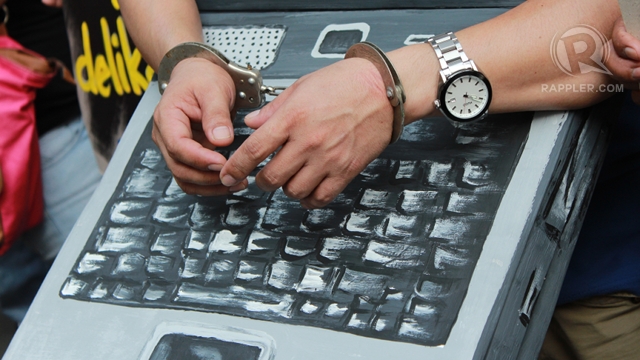SUMMARY
This is AI generated summarization, which may have errors. For context, always refer to the full article.
MANILA, Philippines – The government is ready for the legal battle on the controversial anti-cybercrime law.
Presidential Spokesperson Edwin Lacierda said the Office of the Solicitor General (OSG) will be able to defend the law before the Supreme Court in oral arguments on Tuesday, January 15.
Lacierda said that while the OSG has conceded that the so-called takedown clause is unconstitutional, it can defend the other provisions of the law.
In a comment to the petitions against the law, Solicitor General Francis Jardeleza said the provision allowing the Department of Justice to block or restrict access to computer data without a court-issued warrant is a form of “final prior restraint” and violates freedom of expression.
Jardeleza also said the provision allowing law enforcement authorities to record traffic data in real-time should be amended to require prior judicial authorization like a warrant.
Lacierda said, “I think he defended also the penalty for libel.”
“So let’s wait for the decision of the Supreme Court. The position taken by the OSG is that the takedown clause is unconstitutional but with respect to the other issues, the Solicitor General posited the position that they are defensible.”
There are 16 petitions questioning the Cybercrime Prevention Act of 2012, which President Benigno Aquino III signed into law in September 2012. The Supreme Court issued a 120-day temporary restraining order on the implementation of the law in October 2012.
Human rights groups, Internet users, journalists, bloggers, and academics have said the law gives government too much power over netizens, violating freedom of speech, freedom of expression, and privacy.
Some critics turned to hacking to express their opposition to the law. Lacierda said the government already has leads on the identities of the hackers and is expected to take action.
Aquino has defended the law, saying it should be seen in its entirety. He said the law addresses legal gaps covering crimes like computer fraud, identity theft, and computer-related forgery.
Legislative remedies still possible?
Ahead of the oral arguments, Akbayan Rep Walden Bello reiterated his call for Aquino to certify as urgent pending bills amending the law.
Bello filed a bill that seeks to repeal the provision on online libel, and requires a court warrant before the government can collect or restrict access to computer data.
In October last year, Bello already urged Malacañang to certify the measure urgent. Doing so will allow Congress to vote on the bill on 2nd and 3rd reading on the same day, expending its passage.
“President Aquino must join the people in celebrating the Internet as a platform of genuine democracy. It is not too late for him to change his position on the Cybercrime Prevention Act and join us in amending its infirmities,” Bello said.
Bello added, “The popular clamor against it has not waned, and continues, in fact, to gain strength. President Aquino must respond to the call of the people, and publicly recognize the mistakes of the law by supporting efforts to amend it.”
Aside from Bello, other lawmakers filed various bills to amend or repeal parts of the law. Sen Miriam Defensor Santiago, for example, is proposing the Magna Carta for Philippine Internet Freedom.
Other critics of the law, though, doubt Congress will be able to pass the amendatory bills in time, with only 9 session days left when both houses re-open next week. They said the only quick remedy is action from the Supreme Court.
Some petitioners have asked the Supreme Court to extend the 120-day temporary restraining order on the implementation of the law.
The order is set to lapse on February 6. – Rappler.com
More on the Cybercrime law:
Add a comment
How does this make you feel?

There are no comments yet. Add your comment to start the conversation.